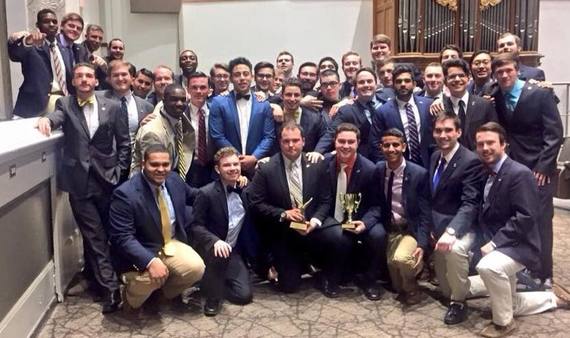Often times when Greek life, fraternity and sorority organizations at colleges and universities, receives public attention it is attributable to negative undertones. Take for example a recent op-ed in Inside Higher Ed, which explores everything from sexual assault, suspensions, to wild parties and destruction of property. Truth be told -- there have been nefarious actions of many of these organizations and members across the higher education system in the United States -- and it does a disservice to attempt to rationalize or justify events which have basis in fact and should be addressed. However, as is stated often in opposition, these instances do not always paint an accurate portrayal. These organizations, made up of thousands of young students across the United States (over 9 million by some reports), are committed to philanthropic endeavors, academics, pro-social activities, and perhaps less discussed -- family.
In the spring of 2015, I began a journey to become an active member of one of these Greek organizations, Pi Kappa Phi. A few years prior I had also entered into long-term recovery from a substance use disorder and co-occurring mental health disorder. In most circles, this decision was lambasted as short-sighted and potentially dangerous to my personal recovery; these suggestions could not have been farther from the truth however. While many of the then active brothers at the Gamma Tau Chapter of Pi Kappa Phi had never heard or knew anything about recovery from behavioral health concerns, many others had personal stories of substance misuse occurring in their families, and some others even had their own personal stories of struggling with mental health concerns.
My Pi Kapp brothers, from the beginning, were overtly supportive of my personal decisions not to drink or engage in any activities that may have had alcohol involved in it (university sanctioned events only, of course). From the time I signed my pledge-ship invitation, to the time I was initiated, I was never pressured surrounding my choice, and more often than not was asked to describe my recovery and what it all meant. A few brothers even began participating in campus recovery meetings, a testament to the power of social connection and recovery if there ever was one.
Pi Kapp is one of the many fraternal organizations that practices what it preaches. With ideals and values rooted in the concepts of brotherhood, service, and commitment -- the brothers and alumni members of this organization are true stewards to their communities. During the period of my initiation, Gamma Tau partnered with the Collegiate Recovery Program at the University of North Texas to host a 5K race and musical concert to raise money for the fraternity's national philanthropy, the Ability Experience which supports individuals with physical and intellectual disabilities, as well as for students in recovery at the University of North Texas. This collaboration did much to heighten awareness of behavioral health and recovery, as well as break down barriers between a community that often is stigmatized itself about caring only about parties and alcohol.
Over the course of the last three years, I have had an opportunity to not only find a support system that directly supports my recovery in the form of a collegiate recovery program and mutual aid meetings, but to also find an uncommon circle of support in my brothers of Pi Kappa Phi. One of my brothers, Travis Green, whom was initiated along side me, had this to say about our journey together:
Having a brother so dedicated to recovery changed the aspect of fraternity in general. It had an added sense of accountability but also strengthened our bond as brothers to hold each other to a higher standard whether we were actively seeking recovery or not.
Travis is right too -- our chapter of Pi Kappa Phi has forever been changed, with brothers knowing that help exists for the struggles that we all deal with during our college careers.
For many in recovery that are becoming students again, Greek life may be all but forgotten because of the reputation it has acquired over the last few decades. However, my recovery and my college experience has been greatly benefited by my membership in my fraternity, and for a person seeking a normative college experience, which even in recovery is often desired, it has been an irreplaceable experience. I will forever be grateful for the young men that I call brothers at Pi Kappa Phi -- not only for their support, but their commitment to diversity, brotherhood, and leadership at our University.
Read more from Rights for Recovery, and the collegiate recovery experience:
Collegiate Recovery Saved My Life: Graduation
Why Students in Recovery Should Re-Enroll
---
Need help with substance abuse or mental health issues? In the U.S., call 800-662-HELP (4357) for the SAMHSA National Helpline.
